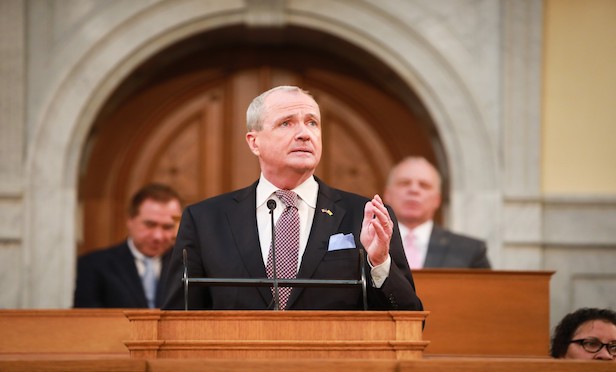 New Jersey Gov. Phil Murphy outlines the FY 2021 budget.
New Jersey Gov. Phil Murphy outlines the FY 2021 budget.
TRENTON, NJ—Gov. Phil Murphy presented his proposed $40.85-billion FY 2021 budget to the State Legislature on Tuesday, which calls for continued property tax reform, increased workforce development and NJ TRANSIT funding and an expansion on the existing millionaires' tax.
"We are making real progress against high property taxes, restoring New Jersey's fiscal standing, growing our economy, and repositioning our state for success by investing in and shaping our future," Gov. Murphy said. "We have a record of unmistakable progress on all fronts, and today, we have a new budget for FY2021 that promises to keep us moving forward in building a stronger and fairer New Jersey for all."
The proposed budget includes another deposit into the Surplus Revenue Fund, or rainy-day fund, which represents the first time in two decades that deposits have been made in consecutive years, the governor noted. The budget's total projected surplus, including the rainy-day fund, is $1.6 billion, or 4% of total appropriations.
The governor's budget supports more than $1.26 billion in direct property tax relief, which includes $276 million for the Homestead Benefit, as well as an increased property tax deduction cap and expanded Senior Freeze eligibility that the governor and legislature enacted in their previous budgets.
Other business-related components of the proposed budget include:
Applying the millionaire's tax enacted in FY2019 to all income above $1 million, not just income of more than $5 million. This expansion, which will impact more non-New Jersey residents than in-state residents, is necessary to enable greater investment in programs, including property tax relief, for the middle class, the governor stated.
The Department of Labor and Workforce Development will allocate more than $20 million to advance the governor's Jobs NJ plan. These funds will support apprenticeships, paid internships, incumbent career training, and targeted solutions for businesses facing talent challenges.
To build on the Business First Stop program, the budget will support a permit modernization project to make state requirements more efficient and transparent. The budget will also triple support for the Commission on Science, Innovation and Technology to advance collaborations between industry and academia.
The budget includes a General Fund subsidy of nearly $600 million, which is a $132-million increase over FY2020, to support NJ TRANSIT's daily operations while allowing for bus and rail enhancements, new hiring, and a Battery Electric Bus program that advances the state's clean energy goals. If the governor's proposals are enacted, NJ TRANSIT will for the third consecutive year not impose a fare increase.
The Clean Energy Fund will have $263 million for Clean Energy programs, compared to an average $177 million under the Christie Administration. In addition to supporting energy efficiency programs and $30 million worth of electric vehicle rebates, the Clean Energy Fund will also support the launch of a Green Bank and clean tech incubators.
The governor's budget proposes an $80 million appropriation to the Drinking Water Program as a first step of the administration's plan to ensure safe and modern water infrastructure.
© Touchpoint Markets, All Rights Reserved. Request academic re-use from www.copyright.com. All other uses, submit a request to [email protected]. For more inforrmation visit Asset & Logo Licensing.







